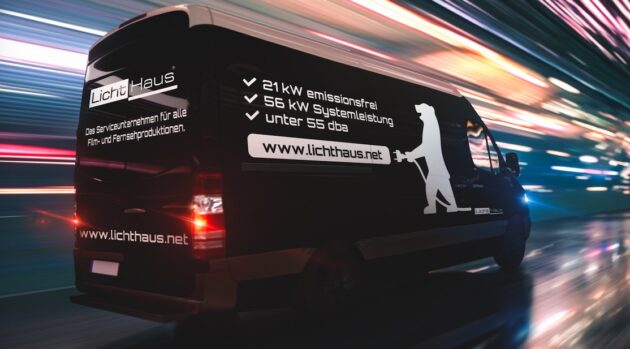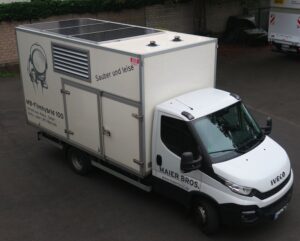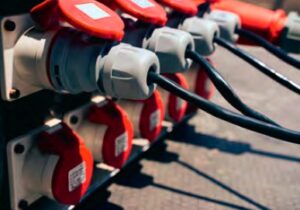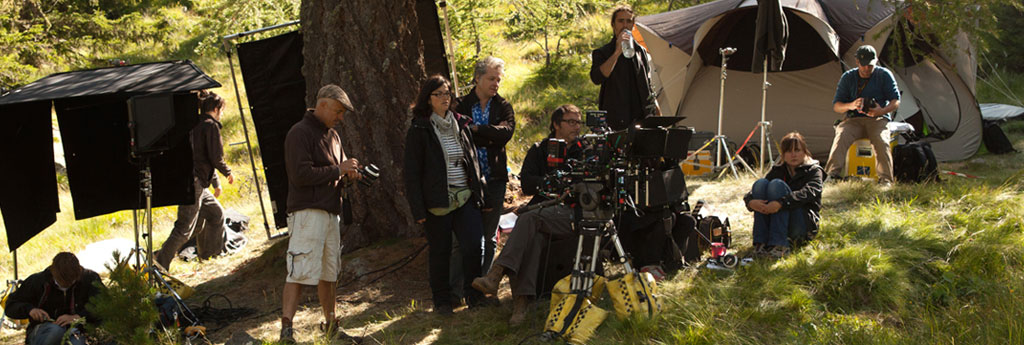
In the case of vehicles as well as generators, the trend is towards hybrid solutions that are replacing classic diesel models. In order to bring the requirements of the film industry in line with the legal guidelines relating to noise and exhaust emissions, Berlin Lichthaus developed, especially for the film industry, in collaboration with MTD Medient and Whisper Power GmbH, the Stage V Hybrid Green Shooting System, which combines a storage system with a diesel generator as backup.
“Up to a load of 21 kW, it’s possible to work for a certain length of time completely emission-free with power from the battery storage”, explains Mike Zimmermann, Managing Director at Lichthaus. “In case more power is needed, the generator kicks in.” The system performance, which results from the combination of the inverter and the generator, comes down to 56 kW. The power which has not been drawn from the generator is used to charge the 32 kW lithium iron phosphate storage battery. The 35 kW diesel generator meets the requirements of the EU Stage V emission level, and it operates at a low-noise level with less than 55 dBA. The Stage V Hybrid Green Shooting System is integrated into a box-type van.
 An innovative in-house development project is being launched by Mobilespace to create a hybrid
An innovative in-house development project is being launched by Mobilespace to create a hybrid
battery truck. The truck is outfitted with a 160 kWh battery which has 100 kW of output, enough to provide an independent power supply for set and base for larger film productions. The battery can be charged by conventional three-phase currents, by charging stations, or by the integrated backup diesel generator. “We made a point of constructing a hybrid system that could be integrated into familiar film production routines without incurring any additional staffing expenses”, says Moritz Kromer, Managing Director at Mobilespace.
That can save up to 200 liters of fuel per shooting day. “One battery load should last for at least one shooting day”, continues Kromer, who offers clients the opportunity to charge the rentaldevice for free overnight at Mobilespace in Hamburg or Berlin, both of which rely on renewables or rather solar power from their in-house photovoltaic system. In the case that it can’t be charged anywhere with three-phase current from the grid or a charging station, the generator automatically starts and repowers the battery within two hours. Instead of consuming about 150 liters of diesel per shooting day, the back-up needs only about 30 liters of diesel, which reduces up to 80 percent of carbon emissions. The hybrid battery truck is about 6.5 meters in length; it comes with a trailer hitch; and it requires a class C driver’s license.
 “Hybrid systems are the future. Small- and medium-load requirements will be covered by batteries; huge loads by motors”, explains Niels Maier, who developed the MB-Filmhybrid 100 with his Cologne-based equipment rental house Maier Bros. After the prototype of this hybrid generator has been used on productions such as Babylon Berlin, the MB-Filmhybrid
“Hybrid systems are the future. Small- and medium-load requirements will be covered by batteries; huge loads by motors”, explains Niels Maier, who developed the MB-Filmhybrid 100 with his Cologne-based equipment rental house Maier Bros. After the prototype of this hybrid generator has been used on productions such as Babylon Berlin, the MB-Filmhybrid
100 will be released in a limited series of six vehicles. Since the conversion of engine to LPG (Liquified Petroleum Gas) didn’t work out, a limited series will be constructed on the basis of a Euro 6 diesel frame, and only the generator will be powered by LPG. The MB-Filmhybrid 100 is manufactured by Polyma, which provided film productions with the first mobile power bank in 2017.
“Switching on a diesel generator shouldn‘t be taken for granted“, emphasizes Niels Maier. Before each shoot, it should always be determined where the closest grid access point is located.” Until recently, it was too expensive for productions in Hamburg to install temporary grid access for short-term shoots. “We found a solution with the grid provider Stromnetz Hamburg, so that the City can offer better terms to film crews”, says Christiane Dopp, who works with the Film Commission in Hamburg at the Moin Film Fund Hamburg Schleswig-Holstein, a crucial liaison for productions over the last twenty years.
 „In January 2022, Stromnetz Hamburg halved the costs for the installation of temporary grid access. “The setup and removal of the mobile meters of up to 100A is only 445 euros”, stresses Anette Polkehn-Appel, spokesperson
„In January 2022, Stromnetz Hamburg halved the costs for the installation of temporary grid access. “The setup and removal of the mobile meters of up to 100A is only 445 euros”, stresses Anette Polkehn-Appel, spokesperson
for Stromnetz Hamburg. Furthermore, the application form for grid access has been optimized. When productions are looking for installation service, they can go straight to a company that has agreement with providers of renewables. “Grid access pays off for my production on the second shooting day”, Location Manager Daniel Matthaei points out. “Because it can get pretty expensive when you need 150 to 200 liters of diesel fuel per shooting day.”
Photos: © Lichthaus Berlin GmbH, Moritz Kromer/ Mobilespace, Niels Maier/ Maier Bros, Scarc/Shutterstock













 Robert Redford
Robert Redford Hannes Jaenicke
Hannes Jaenicke Nic Balthazar
Nic Balthazar Nadeshda Brennicke, Actress
Nadeshda Brennicke, Actress Darren Aronofsky, Director, Noah / Jury President, 65th Berlin International Film Festival
Darren Aronofsky, Director, Noah / Jury President, 65th Berlin International Film Festival Tim Bevan
Tim Bevan Thekla Reuten
Thekla Reuten Rachael Joy
Rachael Joy Nikola Rakocevi
Nikola Rakocevi Nadja Schildknecht
Nadja Schildknecht Michael Bully Herbig
Michael Bully Herbig Lars Jessen
Lars Jessen Helen Hunt
Helen Hunt Douglas Trumbull
Douglas Trumbull Dieter Kosslick, Director Berlin International Film Festival
Dieter Kosslick, Director Berlin International Film Festival Benoit Delhomme
Benoit Delhomme Jeremy Irons
Jeremy Irons